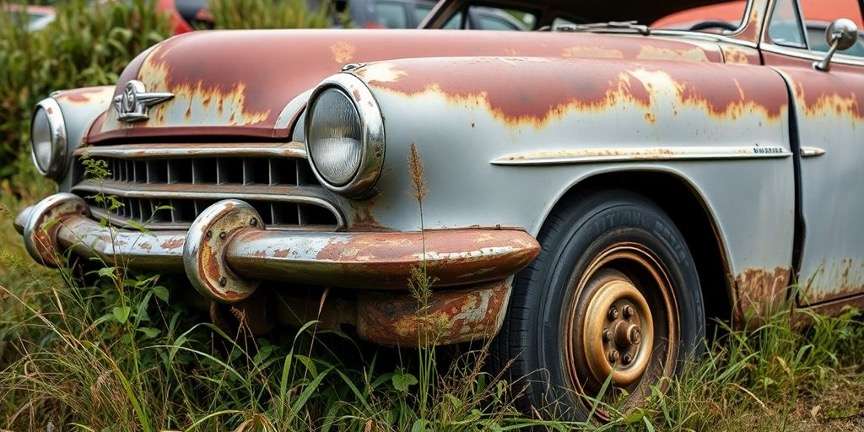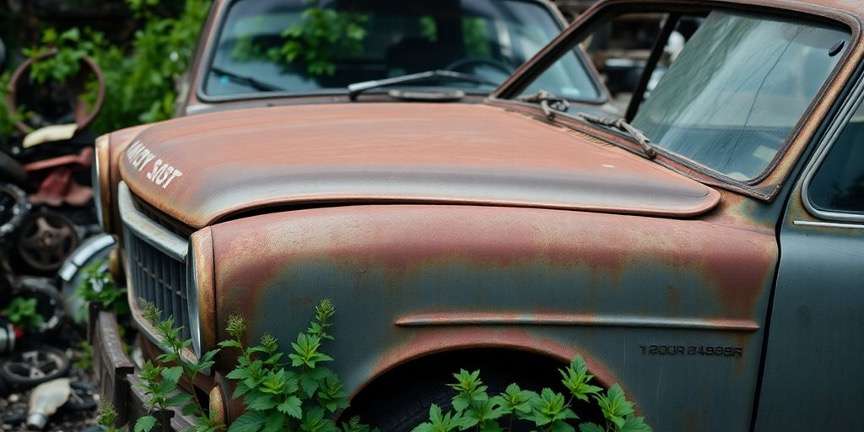Key Takeaways
- Selling a junk car can count as taxable income, so be prepared to report it.
- You might be able to reduce taxable income with related expenses like towing or repairs.
- Donating your junk car to a charity can offer tax deductions, but make sure the charity is qualified.
- Always report the sale or donation to stay on the right side of tax laws.
- Consider timing and market conditions to get the best financial outcome from selling your junk car.
Understanding the Tax Implications of Selling a Junk Car

Taxable Income from Junk Car Sales
When you sell a junk car, the money you get is usually considered taxable income. This means you should report it when you file your taxes. Even if your old car seems worthless, the IRS might see it differently if you sell it. It's like selling any other item you own, where the profit can be taxed. But don't worry, there are ways to reduce this taxable amount.
Offsetting Income with Related Expenses
You might be able to lower your taxable income from the sale by deducting related expenses. For example, if you had to pay for towing or minor repairs to make the car sellable, you can subtract those costs from the sale price. This can help reduce your tax bill. Keep all your receipts and documents handy to make sure you can prove these expenses if needed.
Legal Requirements for Reporting Sales
It's important to follow the legal requirements for reporting the sale of your junk car. Failing to do so might lead to penalties. You need to report the sale on your tax return, even if the car was sold for a small amount. Some states may also require you to notify the local DMV or another authority about the sale. This ensures the car is no longer in your name, freeing you from any future liabilities.
Exploring Tax Deductions and Credits
Eligibility for Tax Deductions
When it comes to selling a junk car, understanding potential tax deductions can be a game-changer. If you've used your vehicle for business purposes, you might be eligible for deductions related to depreciation. This is where the car's value decreases over time, and you can claim this loss on your taxes. It's important to keep accurate records of your vehicle's usage to maximize these deductions.
Charitable Donations and Tax Benefits
Donating your junk car to a charity is another way to potentially reduce your tax bill. If you donate to a qualified charitable organization, you can claim a deduction for the car's fair market value. Just make sure to get a written acknowledgment from the charity, as this is required by the IRS. It's a win-win situation, benefiting both you and the charity.
Environmental Credits for Eco-Friendly Disposal
Selling or disposing of your junk car in an environmentally friendly manner might qualify you for environmental credits. These credits reward actions that reduce environmental impact, such as recycling hazardous materials. While not every disposal method qualifies, it's worth checking out if your eco-friendly actions can lead to some tax benefits.
Selling a junk car isn't just about getting rid of an old vehicle; it's about understanding the financial and environmental implications. By exploring available tax deductions and credits, you can make the most out of your junk car sale while contributing positively to the environment.
For more detailed information on federal tax laws, especially if you're self-employed or a statutory employee, check out this publication.
Navigating Legal and Compliance Requirements
Title Transfer and Legal Obligations
When you sell a junk car, transferring the title is a must. This step legally shifts ownership from you to the buyer and helps you avoid any future liabilities. Make sure you fill out the title transfer form correctly, including the odometer reading and sale price. Some states might require a bill of sale or additional paperwork, so check your local DMV’s requirements to ensure everything is in order.
Reporting Sale or Disposal to Authorities
After selling or disposing of your junk car, it’s important to report this to the relevant authorities. This often involves notifying your local DMV about the change in ownership. Failing to do so might lead to unexpected fines or complications if the vehicle is involved in any legal issues post-sale.
Ensuring Compliance with Local Regulations
Different states have different rules for selling junk cars. Understanding these local regulations can prevent legal headaches down the line. For example, some areas require emissions tests or other environmental checks before a junk car can be legally sold. Always double-check what’s needed in your region to stay compliant.
Selling a junk car isn't just about getting rid of an old vehicle—it's about doing it the right way to avoid future problems. Make sure you're aware of all legal requirements to ensure a smooth transaction.
Maximizing Financial Benefits from Junk Car Sales
Evaluating Your Junk Car's Worth
When you're looking to sell your junk car, the first step is figuring out what it's worth. Understanding your car’s value helps you set realistic expectations and negotiate better deals. Consider factors like the age, condition, and demand for your car model. Older cars usually have less value unless they're classic models that collectors might want. Also, keep an eye on the scrap metal market, as prices can swing based on demand and economic conditions.
Negotiating the Best Price
Once you know your car's worth, it's time to haggle. Getting multiple quotes from junkyards and online platforms can give you a good idea of the going rate. Don't just jump at the first offer; compare and contrast. Look for buyers who are known for fair deals and prompt payments. If you're selling your car for cash, selling your car for cash offers the advantage of immediate payment. Remember, a clean car can sometimes fetch a better price, even if it's junk.
Timing the Sale for Maximum Return
Timing can make a big difference in how much you get. Spring and summer are usually the best times to sell, as more people are on the hunt for car parts or affordable vehicles. Also, keep tabs on scrap metal prices—they can fluctuate and affect your bottom line. If there's a surge in demand, like after a natural disaster, you might snag a better deal. By being strategic about when you sell, you can maximize your returns and make the most out of your junk car sale.
Selling a junk car isn't just about getting rid of an old vehicle; it's about making the most of what you have. By evaluating your car's worth, negotiating wisely, and timing your sale, you can turn that old clunker into a profitable venture.
Choosing Between Selling and Donating Your Junk Car
Deciding whether to sell or donate your junk car can be a tough choice, and it really depends on what you're looking to get out of it. Here's a closer look at both options to help you make the best decision for your situation.
Benefits of Selling to a Junkyard
Selling your car to a junkyard is often the quickest and simplest way to get rid of it. Instant cash is a major advantage, especially if you need money fast. Junkyards usually pay cash on the spot, which is great if you don't want to wait for a tax season to see any benefits. Plus, many junkyards offer free towing services, so you don't have to worry about how to get your car there.
However, keep in mind that the price you get might not be very high, especially if your car is older or severely damaged. Junkyards typically base their offers on the scrap metal weight and any usable parts, so don't expect top dollar. But if your main goal is to get rid of the car quickly and with minimal hassle, selling it to a junkyard could be the way to go.
Advantages of Donating to Charity
Donating your car to a charity can be a very rewarding experience. Not only are you supporting a good cause, but you might also be eligible for a tax deduction. When you donate to a qualified charity, you can often deduct the fair market value of the car from your taxes. However, the charitable deduction is usually limited to the sales price received by the charity, not the car's market value.
Another plus is that many charities handle all the paperwork and offer free pickup, making the process relatively easy. But remember, the financial gain from a donation is limited to the tax deduction, which might not be as immediate or substantial as cash from a sale.
Comparing Financial and Tax Benefits
When weighing your options, consider what's more important to you: immediate cash or potential tax savings. Selling your car to a junkyard means you get cash right away, but donating it could mean a tax deduction later on, assuming the charity is IRS-qualified. Here's a quick comparison:
| Option | Immediate Cash | Tax Deduction | Ease of Process |
| Selling | Yes | No | Easy |
| Donating | No | Yes | Moderately Easy |
Ultimately, the choice between selling and donating your junk car depends on your personal priorities and financial situation. Whether you need quick cash or want to support a cause, both options have their merits. Take your time to weigh the pros and cons, and choose the path that aligns best with your goals.
Streamlining the Junk Car Selling Process
Efficient Selling and Documentation
Selling a junk car might seem straightforward, but a bit of prep can make the process much smoother. Gather all necessary paperwork first—like the car's title, registration, and any maintenance records. Having these ready not only saves time but also reassures potential buyers that everything is legit. Next, shop around for quotes. Check with local junkyards, recyclers, and even online platforms. Comparing offers helps you snag the best deal. Some sites let you punch in your car’s details for an instant offer, which is super handy.
Prompt Payment Options
Getting paid quickly is often a top priority. Many buyers offer different payment methods like cash, checks, or electronic transfers. Each has its perks. Cash is immediate and simple, but make sure you count it before handing over the keys. Checks are okay if you trust the buyer, but they can bounce, which is a hassle. Electronic transfers are safe and fast, providing a record of the transaction. Some buyers even pay on the spot when they pick up the car, which is convenient. Just confirm the amount and method beforehand to avoid any surprises.
Avoiding Common Pitfalls in Transactions
Selling a junk car isn’t without its pitfalls. Watch out for buyers who offer too-good-to-be-true prices—they might be scams. Legit buyers won’t ask for upfront fees for towing or processing. Always verify a buyer’s reputation; check reviews or ask for proof of legitimacy. It’s also wise to document everything—keep records of communications, offers, and agreements. This can protect you if disputes arise later.
Selling a junk car doesn’t have to be a headache. With the right prep and a bit of caution, you can streamline the process and avoid common pitfalls. Getting everything in order beforehand ensures a smoother transaction and gets you paid faster.
Understanding the Impact of Junk Car Disposal

Environmental Benefits of Recycling
Recycling junk cars is more than just a way to clear out space. It's a step towards a cleaner planet. When you recycle, you're ensuring that materials like metal, plastic, and rubber are reused instead of ending up in a landfill. This not only conserves resources but also reduces pollution. For instance, recycled metals require less energy to process compared to mining new ore. Plus, non-metal components, like tires, can be repurposed for things like playground surfaces or road construction.
Reducing Carbon Footprint
Disposing of a junk car in an eco-friendly manner can significantly cut down on the carbon emissions associated with traditional disposal methods. Choosing local recyclers helps minimize transportation distances, which in turn reduces fuel consumption and emissions. Some services even offer eco-friendly towing options, using fuel-efficient vehicles to lessen the environmental impact further. It's a small step, but every bit counts in the fight against climate change.
Supporting Sustainable Practices
By opting for recycling, you're supporting sustainable practices within the automotive industry. Components such as engines and electronics can be refurbished and sold, providing affordable options for car repairs and promoting a circular economy. This not only conserves resources but also supports a market for recycled automotive parts. Moreover, fluids like oil and coolant can be cleaned and reused, preventing hazardous materials from contaminating the environment. By making these choices, you're contributing to a more sustainable future.
Wrapping It Up: Tax Implications of Selling Your Junk Car
So, there you have it. Selling a junk car isn't just about getting rid of an old clunker; it's about understanding the tax side of things too. Whether you're pocketing some cash or thinking about donating it for a tax break, knowing the rules can save you a headache later. Keep track of any expenses related to the sale, like towing or repairs, because they might help you out come tax time. And if you're donating, make sure the charity is legit so you can claim that deduction. At the end of the day, it's all about making the most of your junk car, whether that's through a little extra cash or a nice tax deduction. Just remember to keep your paperwork in order and maybe consult a tax pro if you're unsure. Happy selling!
Frequently Asked Questions
Do I have to pay taxes when I sell my junk car?
Yes, selling your junk car is usually considered taxable income. Make sure to report it when filing your taxes.
Can I get a tax deduction if I donate my junk car?
Yes, if you donate your car to a qualified charity, you can claim a tax deduction. The deduction is based on the car's value or sale price.
What paperwork do I need to sell my junk car?
You'll need the car's title, registration, and any other documents that prove ownership. These help make the sale legal and smooth.
Is it better to sell or donate my junk car?
It depends on your goals. Selling gives you quick cash, while donating might offer tax benefits and help a good cause.
How can I ensure a smooth junk car sale?
Choose a reputable buyer, confirm all details, secure payment before handing over the car, and keep all transaction records.
Are there environmental benefits to recycling my junk car?
Yes, recycling helps reduce waste and can minimize the impact on landfills. It's an eco-friendly way to dispose of your car.



